Attività seminariale del Dipartimento
Il Dipartimento di Scienze della Terra, nell'ambito delle attività di formazione e divulgazione scientifica, organizza periodicamente cicli di seminari a carattere scientifico e di orientamento nel mondo del lavoro.
I seminari sono tenuti da relatori provenienti da Università e Centri di Ricerca italiani ed esteri.
Sono rivolti agli studenti e neo laureati del percorso formativo di riferimento, ma sono aperti a tutti gli interessati.
Programmazione
TEM Investigation of Oriented Thin Films in Structural Geology - Moving Towards Nanokinematic Analysis - Prof. Dr. Manish A. Mamtani
Giovedì 5 giugno 2025 ore 11:00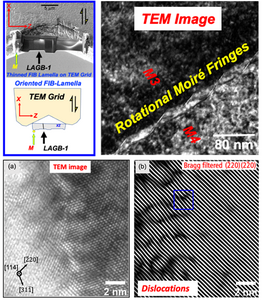
This lecture will focus on the investigation of nanostructures in deformed rocks using the Transmission Electron Microscope (TEM). The entire work-flow involving collection of an oriented rock sample in the field, through preparation of an oriented rock thin section in the kinematic reference frame and its SEM-EBSD analysis, followed by excavation of oriented lamella (thin film) using Focused Ion Beam (FIB) technique will be presented. Nanostructures observed in magnetite grains hosted in deformed rocks will be taken as an example to highlight the importance of such studies in deciphering nanokinematics and relating them to larger scale deformation. The importance of investigating nanostructures and dislocation density in oriented thin films excavated “in-plane”, parallel to the kinematic reference frame (XZ of strain ellipsoid) will be discussed thus leading to the scientific question – ARE GRAIN BOUNDARIES IN MINERALS ANALOGOUS TO ZONES OF STRAIN LOCALIZATION AT THE NANOSCALE?
The Speaker: Prof. Dr. Manish A. Mamtani
Department of Geology & GeophysicsIndian Institute of Technology (IIT) Kharagpur, INDIA, Email: mamtani@gg.iitkgp.ac.in
Manish A. Mamtani is a Professor of Structural Geology from IIT Kharagpur (India) with special interest in fabric analysis of deformed rocks integrating magnetic methods and microscopy (light and electron). He is a DAAD as well as Humboldt Research Fellow, and recipient of several awards and honours in India. Professor Mamtani is the President of International Association for Structural Geology & Tectonics (IASGT), Vice-President of the Geological Society of India, and a board member of the European Society for Deformation Mechanisms, Rheology & Tectonics (DRT). He is also an Advisory Editorial Board Member of the Journal of Structural Geology. Prof. Mamtani is presently visiting University of Turin under an Erasmus project.
Onsite: h. 11:00 Aula Pognante DST
Online: https://unito.webex.com/unito/
Numero riunione: 2780 326 3920
Password: PgVTr6Qh546
 Allegato
(0.4 MB)
Allegato
(0.4 MB) Application of Anisotropy of Magnetic Susceptibility (AMS) in Structural Geology - Prof. Dr. Manish A. Mamtani
Mercoledì 28 maggio 2025 ore 11:00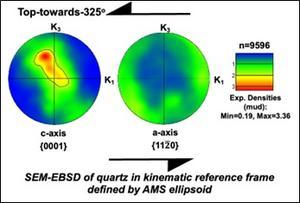
Deformed rocks tend to develop a preferential orientation of minerals that maybe manifested in the form of foliation and/or mineral stretching lineation. “Anisotropy of Magnetic Susceptibility” (AMS) is a useful method to measure such preferred orientation of minerals and perform petrofabric analysis in rocks. AMS data from tectonically deformed rocks leads to the identification of the principal axes of the strain ellipsoid. In this lecture the importance of this in identifying the kinematic reference frame and shear sense studies, particularly in deformed rocks devoid of visible foliation and/or lineations, will be highlighted. Geological examples will be presented to document the importance of AMS in fabric analysis of granitic rocks, vorticity quantification and establishing time-relationship between granite emplacement, fabric development and regional deformation. Moreover, the usefulness of integrating SEM-EBSD with AMS data to decipher regional tectonics as well as superposed folding will be discussed.
The Speaker: Prof. Dr. Manish A. Mamtani (Department of Geology & Geophysics Indian Institute of Technology (IIT) Kharagpur, INDIA; Email: mamtani@gg.iitkgp.ac.in)
Manish A. Mamtani is a Professor of Structural Geology from IIT Kharagpur (India) with special interest in fabric analysis of deformed rocks integrating magnetic methods and microscopy (light and electron). He is a DAAD as well as Humboldt Research Fellow, and recipient of several awards and honours in India. Professor Mamtani is the President of International Association for Structural Geology & Tectonics (IASGT), Vice-President of the Geological Society of India, and a board member of the European Society for Deformation Mechanisms, Rheology & Tectonics (DRT). He is also an Advisory Editorial Board Member of the Journal of Structural Geology.
On site: h. 11:00 Aula Ruffini DST
Contacts: geoseminar.dst@unito.it
 Allegato
(1.3 MB)
Allegato
(1.3 MB) ANALISI CLIMATICHE E AMBIENTALI DI CITTÀ E MONTAGNE NELLA ZONA SEMIARIDA DEL BRASILE SETTENTRIONALE - Prof.ssa Isorlanda Caracristi
Giovedì 29 maggio 2025 ore 14:00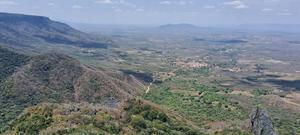
Verrà presentata la ricerca sviluppata dal Gruppo di Ricerca "Studi Geografici dei Sistemi Ambientali e dei Climi Interregionali", collegato al Laboratorio di Studi Ambientali e Climatici (LEAC). La ricerca si concentra sulla regione nord-occidentale dello Stato del Ceará, situato nel nord-est del Brasile. Questa regione è composta da un ambiente semiarido caldo, dove si trovano città di piccole e medie dimensioni e una vasta area rurale punteggiata da montagne, e che presenta processi di desertificazione. Verranno presentate le metodologie, le tecniche e i risultati. Verranno presentati i progetti: Analisi degli impatti climatico-ambientali della crescita urbana nelle città di piccole e medie dimensioni e Analisi e zonazione climatico-ambientale e biogeografica delle piccole montagne aride.
The Speaker: Prof.ssa Isorlanda Caracristi (Corso di Laurea Magistrale in Geografia, Università Statale Vale do Acaraú – Brasile)
Geografa, Dottore di Ricerca in Geografia Fisica e Professoressa di Geografia presso l'Universidade Estadual Vale do Acaraú (UEVA). Svolge attività di ricerca nell'ambito della Climatologia Geografica. Coordina il Laboratorio di Studi Ambientali e Climatici (LEAC) e dirige il Gruppo di Ricerca "Studi Geografici sui Sistemi Ambientali e sui Climi Intraregionali". È Caporedattrice della Rivista della Casa di Geografia di Sobral (RCGS).
On site: h. 14:00 Aula A (Galfer) - Isttuto Galileo Ferraris
Contacts: geoseminar.dst@unito.it
 Allegato
(1.4 MB)
Allegato
(1.4 MB) From Ground Motion to the Earthquake Preparatory Phase: Lessons from the February 2023 Türkiye Doublet and Beyond - Dr. Leonardo Colavitti | The power of laboratory acoustic emissions to study thermo-hydro-mechanical coupled processes - Dr. Marco Fazio
Mercoledì 21 maggio 2025 ore 14:00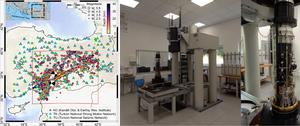
From Ground Motion to the Earthquake Preparatory Phase: Lessons from the February 2023 Türkiye Doublet and Beyond
On February 6, 2023, a seismic sequence struck southern Türkiye and western Syria along the East Anatolian Fault Zone (EAFZ), producing two major earthquakes: a moment magnitude (Mw) 7.8 earthquake followed by a Mw 7.6 event occurred northeast of the first rupture. To investigate the characteristics of the seismic source and strong motion parameters, we built a high-quality dataset of low-to-moderate magnitude events (2.0 ≤ ML ≤ 5.5) that occurred along the main segments of the EAFZ between January 1, 2019, and February 29, 2024. We then applied a non-parametric Generalized Inversion Technique (GIT) to isolate the source, propagation, and site contributions to the Fourier Amplitude Spectra (FAS) of 9,442 events recorded by 173 stations. From this analysis, we retrieved key source parameters, such as Mw, seismic moment (M0), corner frequency (fc) and stress drop (Δσ), which we used to explore the variability of ground motion before and after the 2023 seismic doublet of February 2023. Through the investigation of ground motion residuals across different fault segments, this talk explores potential proxies for identifying the preparatory phase of major earthquakes – such as seismic efficiency or stress drop anomalies – which may offer valuable insights into regions more susceptible to future seismic crises.
The Speaker: Dr. Leonardo Colavitti (University of Genova)
Leonardo Colavitti is a Postdoctoral Researcher at the Department of Earth, Environmental and Life Sciences (DISTAV) at the University of Genoa (Italy) since December 2023. His research covers various areas of seismology, including seismic imaging, source parameter analysis, and attenuation studies. After graduating at the University of Trieste (Italy) with a thesis in seismic tomography, he obtained his PhD from the University of Lausanne (Switzerland) in 2020, where he developed a new inversion method for 3-D crustal S-wave velocity models, applied to the Central Alps. Following his PhD, he worked as a Postdoc at the INGV in Milan (Italy), focusing on source directivity for small to moderate earthquakes and near-source attenuation in Central Italy area. His current research at DISTAV is particularly focused on the development of high-resolution catalogs, with special attention to source parameters and spatio-temporal variability of potential proxies capable of capturing the preparatory phase of large earthquakes.
On site: h. 14:00 Aula A (Galfer) DST
---------------------------------------------
The power of laboratory acoustic emissions to study thermo-hydro-mechanical coupled processes
The complex interplay between thermal, hydraulic and mechanical (THM) effects on various geological and geo-engineering aspects is crucial to understand and monitor the subsurface, and to make use of georeservoirs for green energy. To help understand THM coupled processes, laboratory experiments on mm-to-cm scale samples provide large amount of data under monitored and controlled conditions. Among these data, acoustic emissions (AEs) signals stand out in the complexity, yet their usefulness is clear: these microseismic signals originate from different sources and can provide insight into the processes occurring during laboratory experiments simulating environmental conditions representative of shallow crustal depths. With this talk I show you examples of different coupled THM processes explained through the recording and analysis of laboratory AEs. I highlight the importance of combining these data with standard laboratory data (e.g. deformation, pressure, temperature) to understand micro-scale processes and the application of these lab-scale results to the field-scale scenarios.
The Speaker: Dr. Marco Fazio (Institut fur Angewandte Geophysik - Hannover)
Marco Fazio is a research assistant at the LIAG – Institute of Applied Geophysics, Hannover (Germany), since January 2025, after working 7 years as postdoc researcher at the University of Göttingen (Germany). Since the beginning of his PhD project at the University of Portsmouth (UK), graduating in 2017, he has been involved in a variety of laboratory experiments to characterize rock mechanical and hydraulic properties. The results of his experiments have a wide range of applications, from volcano monitoring and forecast to geothermal energy. He is particularly interested in monitoring acoustic emissions to understand the thermo-hydro-mechanical coupled processes occurring at the micro-scale within cm-scale samples at representative pressure/temperature conditions.
On site: h. 15:00 Aula A (Galfer) DST
-------------------------------------------
Contacts: geoseminar.dst@unito.it
 Allegato
(2.3 MB)
Allegato
(2.3 MB) 11 febbraio 2025 | Giornata Internazionale delle Donne e delle Ragazze nella Scienza
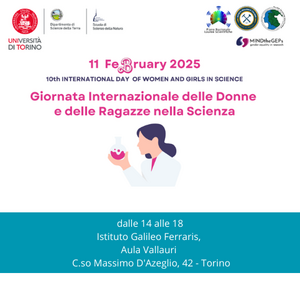
Il giorno 11 febbraio 2025, dalle 14 alle 18, presso l'Aula Vallauri dell'Istituto Galileo Ferraris, in C.so Massimo D'Azeglio, 42 a Torino, si celebra la Giornata Internazionale delle Donne e delle Ragazze nella Scienza, con una conferenza che intende sollecitare riflessioni sul ruolo delle donne nelle discipline STEM, l'accessibilità delle carriere e le numerose sfide ancora aperte per raggiungere la parità.
L'iniziativa, aperta a studenti, dottorand*, personale della ricerca, docente e tecnico amministrativo della Scuola di Scienze della Natura, si svolge in presenza e sarà composta da una parte di seminario e una parte dedicata al workshop empow_lab “Quale discriminazione? Come (r)esistere insieme”.
Il solo seminario sarà accessibile anche da remoto tramite la piattaforma webex
Maggiori informazioni nel programma allegato
 Allegato
(0.5 MB)
Allegato
(0.5 MB) Seeps, vents, and authigenic minerals - reconstructing microbial habitats using lowtemperature geochemistry - Dr. Daniel Smrzka (21/01/2024 - 4pm - Aula Ruffini)
Martedì 21 gennaio 2025 ore 16:00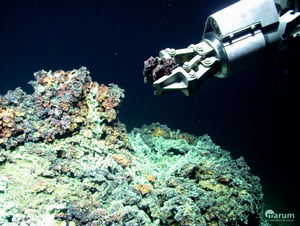
Marine cold seeps and hydrothermal vents are seafloor environments that harbor unique ecosystems based on chemosynthesis. The basis of these ecosystems are microbial communities, which thrive on the chemical energy derived from reducing fluids that are emitted from deep and shallow marine sediments. These organisms also produce a wide array of authigenic minerals including carbonates and sulfides, which are excellent archives to reconstruct pathways and processes of microbial metabolisms that lead to their formation. Trace elements and stable isotopes are powerful tools to elucidate these processes and reconstruct environmental conditions, and novel archives and methodologies being constantly uncovered and refined. This talk gives and overview of different environments and minerals in which I highlight the potential of low-temperature geochemistry in present and past sedimentary and marine environments, and suggest ideas for the future applicaiton of these tools in the geosciences.
The Speaker
Daniel Smrzka is postdoctoral researcher at the MARUM Center for Marine and Environmental Sciences, University of Bremen since 2022. His research interests cover a broad variety of topics including geobiology, low-temperature chemistry, mineral authigenesis, and the geomicrobiology of extreme environments. He obtained his doctorate degree from the University of Vienna in 2018. He is particularly interested in different cold seep ecosystems such as oil seeps, brine seeps, and hydrothermally-influenced seepage systems, as well as reconstructing marine chemosynthesis-based habitats in the rock record using geochemical tools such as stable isotopes, trace elements, and lipid biomarkers.
Onsite: h. 16:00 Aula Ruffini DST
Online at this link.
Contacts: geoseminar.dst@unito.it
 Allegato
(6.4 MB)
Allegato
(6.4 MB)




